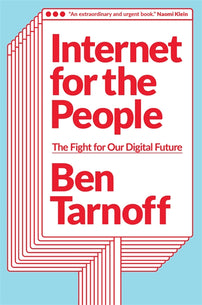Enshittification: The 2023 Digital Word of the Year
"Enshittification," Cory Doctorow's coinage describing the process by which internet media platforms become increasingly unusable and un-quittable, has been named 2023's "Digital Word of the Year." Here, we break down what the term means and Doctorow's solution to the internet's relentless enshittification.

On 6 January, at the New York Times Square Hotel, the 134-year-old American Dialect Society voted that ‘Enshittification’ should be named as the ‘Digital Word of the Year’ for 2023. The decision came after a vote, presided over by Ben Zimmer, chair of the ADS New Words Committee and language columnist for the Wall Street Journal, and Dr. Kelly Elizabeth Wright of Virginia Tech, data czar of the New Words Committee.
But what exactly is Enshittification?
Enshittification became popular in 2023 after it was used in a blog post by author of The Internet Con, Cory Doctorow, who used it to describe how digital platforms can become worse and worse:
“Here is how platforms die: first, they are good to their users; then they abuse their users to make things better for their business customers; finally, they abuse those business customers to claw back all the value for themselves. Then, they die. I call this enshittification.”
[book-strip index="1"]
Doctorow has already expanded on how enshittification pervades our digital lives. It began with a November 2022 post on social quitting in which he looked at the ways that social media platforms like Twitter and Facebook – who are dependent on users’ attention in order to generate revenue – make it ever more difficult to leave. At the same time, however, the services these platforms provide are increasingly degraded: in the end, he argued that the only player finding any benefit from being on the platform was the platform itself. Meanwhile the threats of what one stood to lose by quitting – the switching costs – continued to rise.
Through 2023 the idea spread across platforms and forums – Tiktok, Amazon, Facebook – and was picked up by technologists and thinkers, such as Tim Harford, and John Naughton.
Doctorow not only captured the moment with his neologism, he also offered a solution. Writing for the Electronic Freedom Foundation, he suggested two principles to put users first:
Principle 1: End-to-End: Connecting Willing Listeners With Willing Speakers
Principle 2: Right of Exit: Treating Bad Platforms As Damage and Routing Around Them
The only sane response to this is to give the users more power:
We want a web where users are in control. That means a web where we freely choose our online services from a wide menu and stay with them because we like them, not because we can’t afford to leave. We want a web where you get the things you ask for, not the things that corporate shareholders would prefer that you’d asked for. We want a web where willing listeners and willing speakers, willing sellers and willing buyers, willing makers, and willing audiences are all able to transact and communicate without worrying about their relationships being held hostage or disrupted to cram “sponsored posts” into their eyeballs.
[book-strip index="2"]
Many of these arguments are further unpacked in Doctorow’s book The Internet Con: How to Seize the Means of Computation. In this book, he offers both the argument for how enshittification has occurred, and what we can do about it. We must destroy big tech. Litigation is too slow and we cannot expect anything from the market. The simplest solution is ‘interoperability’. What is interoperability? It is the freedom to move between platforms, to repair, to own your own data rather than allow tech corporations to hold it hostage, to let new competitors into the market that challenge the digital monopolies. It does so by bringing down the high walls that have been built through legal and business means around the platforms to protect what is theirs. These walls are the foundations of enshittification and need to come down:
So long as the pain of staying is less than the pain of leaving, users stay. That means that if companies can raise their switching costs, they can also treat their customers worse - and still keep their business. The corollary: the lower the switching costs are, the better a company has to treat you if they want to keep your business. If users who quit Facebook - resigned their accounts, deleted the app - could still talk to their Facebook friends through a rival service that could interchange messages with it, then Facebook would be in serious trouble.
Interoperability lowers switching costs. Interoperability allows us, the users of technology, to set the terms on which we use that technology. It allows us to use the parts of products and services that benefit us, and block the parts that don’t.
Enshittification is not likely to go away, but may get even worse as platforms struggle to keep hold of an increasingly dissatisfied audience. When Elon Musk at a recent Dealbook Summit/NYT interview stated that any advertiser that tried to blackmail him could go ‘fuck themselves’, this also suggests that user should get used to the dumpster that they are rolling in, because it is only going to get shittier.
[book-strip index="3"]



